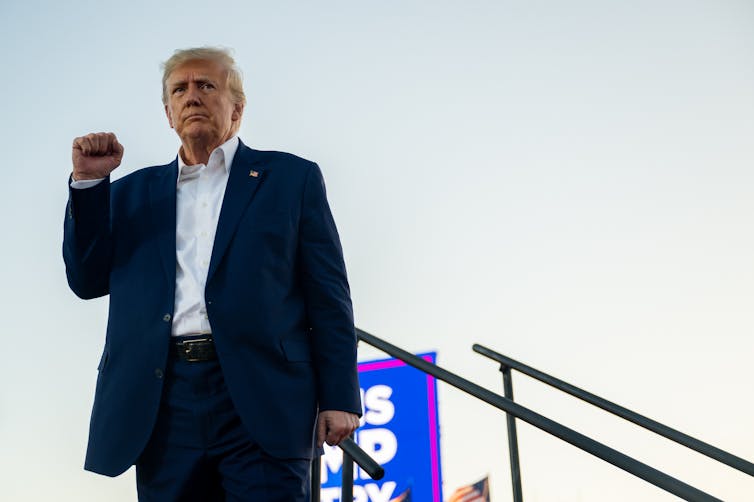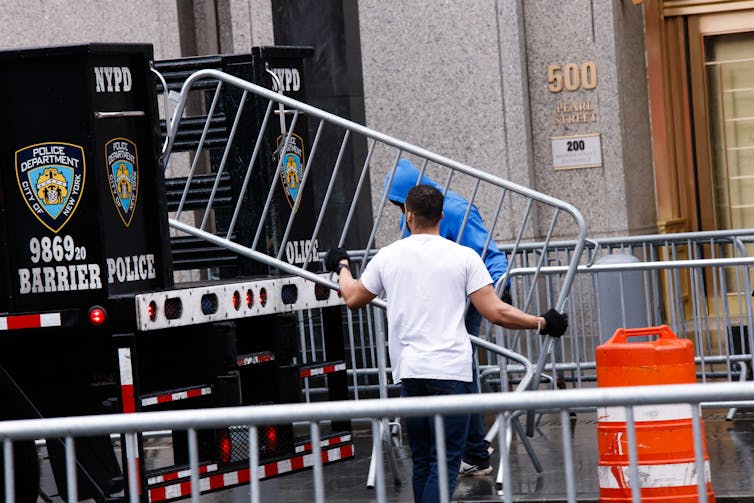The indictment of a former president of the United States, Donald Trump, is history happening in real time. The Conversation asked political scientists James D. Long and Victor Menaldo, both at the University of Washington, to help readers understand the meaning of this moment in the U.S. The two scholars have written about the lessons other democracies can teach the U.S. about prosecuting a president and provide the context for Trump’s arraignment in a Manhattan courthouse.
What was the first thing you thought when you heard that the grand jury voted to indict Trump?
James Long: The first thought I had was about the grand jury, and how much work it is to be on a grand jury. It becomes a part-time job. And how wonderful that we live in a country where that’s how these things are decided. Twenty-three people performed this service that is so critical to the functioning of our country and our democracy. They do it not just for Donald Trump’s case, but for many types of cases. There was something very touching about it.
The strength of our legal system is the thing that makes me proud. What makes me sad is that we’re in this situation. If you think about all the battles that have been fought to make our democracy better, stronger and more inclusive over more than 200 years – we’re now at a place where someone has threatened that to pursue their own interests. That’s just a sad thing to have to experience as a country. I’m glad that we’re going through it following the rule of law, as opposed to fighting it out as a political matter in the streets or fighting a war or something else disastrous, as other countries have done.
Victor Menaldo: I thought of cases that are similar, analogs in other parts of the world. Prime Minister Benjamin Netanyahu in Israel came to mind. Evo Morales in Bolivia came to mind. A bunch of Brazilian former presidents came to mind – the past four, in fact – who went through different stages of prosecution or impeachment, or some were arrested, some spent time in jail.
I also thought about the politics and how Trump might continue down the path he’s been on – getting folks inflamed and throwing fireballs and muddying the waters. How far will he go, and what purposes will that serve – maybe intimidating judges, witnesses and juries and the like – in terms of bolstering his campaign?

What can this indictment do to America?
James Long: My generation lived through President Bill Clinton’s impeachment. As I’ve grown older, I’ve seen other things that other presidents have gotten away with. So I probably thought the indictment would not have been that surprising.
Yet the indictment is shocking to me now. It’s also just shocking in the sense that Trump has spent his entire life in litigation and either getting away with stuff or not, but never being potentially held at a personal level legally liable in a criminal matter – although he does still have the presumption of innocence. It was very shocking to me to think that this has finally happened – like, this really is strange and different.
Victor Menaldo: I tend to see the U.S. as less exceptional these days, at least politically, because of Trump. The various investigations of Trump, and now the indictment, are less surprising than they might have been at one time. Americans had anticipated that a shoe would drop eventually, and this indictment was the shoe, or one of the first shoes. It was bound to happen, because Trump has been pushing the envelope for so long.
I co-authored a book in 2018 with Michael Albertus. Our fundamental premise was that the fear of prosecution drives a lot of politics, across countries and across time. It’s basic to whether you’ll have a democracy or whether the democracy will weaken.
So if you’re afraid of prosecution, you might, if you’re a dictator, prevent democracy at all costs. If you were very nasty, you’d make sure that democracy doesn’t happen or that it happens on your terms, because if it happens on someone else’s terms, you’re going to end up in a prison. You’re going to try to craft a system where the judiciary is beholden to you so you don’t get in any trouble.
My other thought is, thank goodness that this happened once Trump was out of power. You don’t control the machinery of government when you’re out of power. You don’t control the Justice Department. Your power is weak politically, even though Trump is the putative leader of the Republican Party and front-runner in the GOP for the 2024 nomination. But he lacks the cachet he once had and he lacks the powers he would otherwise use to cause much damage. That gives me optimism that this prosecution might not be as existential to our system as it would have been, let’s say, when he was still in power.

Are the arrest and booking symbolically important in the grand story of Trump and America?
James Long: Certainly. I think that is going to be the image that is next to his obituary – a former president’s mug shot.
I believe that Trump’s political stock has declined every day since he’s left office. I think he thinks this prosecution will help him, and it might short term. I think he’s going to try to use that image, much like Jesus on the cross, to say, essentially, “Here I am being martyred at the hands of a Democratic DA in a Democratic state among a grand jury probably made up of citizens who are all Democrats out to get me, and a judge out to get me!”
That mug shot might be an image he’s going to exploit, but ultimately, I believe it’s going to be embarrassing to him. I don’t think moderate Republicans will vote for somebody who is being prosecuted. I think they’re going to shop around. The first primary is a little less than a year away. There’s a long time for the Republicans to politically realign themselves behind another candidate.
Victor Menaldo: Trump’s best move, according to his theory of the world, is to be a martyr and to weaponize the symbolism of a former president being indicted and claim it’s totally politicized.
I would say that anyone who cares about the rule of law in general, Democrats and the folks in these judicial proceedings, in particular, they have to be very careful not to reinforce that weaponization narrative there. I believe the prosecutors will probably do unconventional things and treat Trump differently from your typical defendant. They’ll reduce the odds that there is going to be some mug shot that goes viral, they won’t cuff him, won’t do the perp walk. They’ll treat him with respect and dignity.
How they handle his arraignment is going to be a fascinating game to observe – how to lower the profile of that moment. Their best strategy would be to play it down and try to uphold the dignity of the office or former office. Trump’s best move is to say this prosecution is weaponization of the legal system, milk the idea he’s being persecuted for all it’s worth and some of that will probably stick with his core supporters.
James D. Long, Associate Professor of Political Science, University of Washington and Victor Menaldo, Professor of Political Science, Co-founder of the Political Economy Forum, University of Washington
This article is republished from The Conversation under a Creative Commons license. Read the original article.

